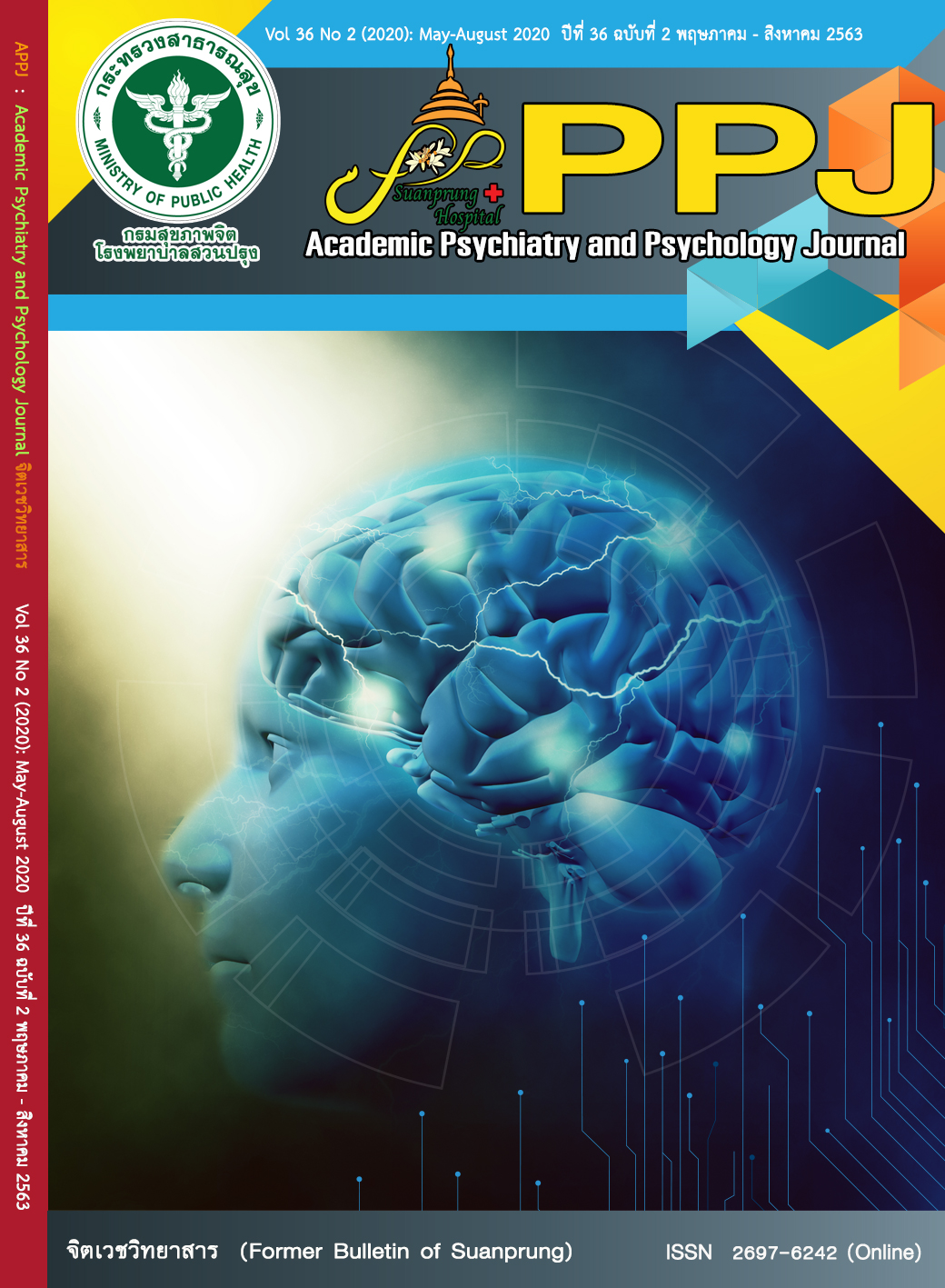The Effectiveness of Implementing Cognitive Behavior Therapy Self-help Among Alcohol Dependence Patients with Depression, Suan Prung Psychiatric Hospital, Chiang Mai Province
Main Article Content
Abstract
Objective: To study the effectiveness of implementing a Cognitive Behavior Therapy Self-help Booklet Among Alcohol Dependence Patients with Depression, Suan Prung Psychiatric Hospital
Materials and Methods: This is an operational study. Purposive sampling included 50 alcohol dependence patients and 6 nurses. The tools used for this study were: 1) demographic data form, 2) Patient Health Questionnaire (PHQ-9), 3) The Time Line Follow Back (TLFB), 4) the Questionnaires of Satisfaction using Self-help Booklet for alcohol dependence patients, 5) the Questionnaires of Nurse’s opinions who suggested Self-Help Booklet, and 6) the Cognitive Behavior Therapy Self-help Booklet developed by Thapinta, Skulphan, Kitsumban, and Longchoopol (2017). Demographic data were analyzed using descriptive statistics according to frequency percentage means and standard deviation. Patients with depression and decreased drinking behavior were analyzed according to frequency and percentage.
Results: Ten patients dropped out of the study. The results regarding 40 patients revealed that at 2 weeks after finishing using the Self-help Booklet and at the follow-up after 6 weeks, patients had a decrease in depression and drinking. The satisfaction of patients who used the Self-help Booklet were at a good level in each aspect studied. The opinions among nurses who suggested the sample group use the Self-help Booklet were at a good level in each aspect studied.
Conclusion: The Cognitive Behavior Therapy Self-help Booklet was effective at decreasing depression and reducing alcohol drinking behavior.
Article Details
บทความหลังผ่านการปรับแก้จากกองบรรณาธิการแล้ว เป็นลิขสิทธ์ของวารสารจิตเวชวิทยาสาร โรงพยาบาลสวนปรุง กรมสุขภาพจิต กระทรวงสาธารณสุข ห้ามเผยแพร่เพื่อประโยชน์ทางการค้าโดยไม่ได้รับอนุญาต แต่อนุญาตให้เผยแพร่บทความดังกล่าวเพื่อประโยชน์ทางการศึกษาแก่ประชาชนทั่วไป ทั้งนี้กองบรรณาธิการไม่จำเป็นต้องเห็นด้วยกับบทความหรือข้อคิดเห็นใดๆ ที่ปรากฏในวารสารสวนปรุง
References
American Psychiatric Association. Diagnostic and statistical manual of mental disorders. BMC Med. 2013;17:133-7.
Kuria MW, Ndetei DM, Obot IS, Khasakhala LI, Bangaka BM, Mbugua MN, Kamau J. The association between alcohol dependence and depression before and treatment for alcohol dependence. ISRN Psychiatry. 2012 Jan 26;2012:482802. doi:10.5402/2012/482802.
Beck JS. Cognitive behavior therapy: Basics and beyond. New York: Guilford Press; 2011.
Thapinta D, Skulphan S, Kitsumban V, Longchoopol C. Cognitive behavior therapy self-help booklet to decrease depression and alcohol use among people with alcohol dependence in Thailand. Issues Ment Health N. 2017;38(11):964-70.
Cuijpers P, Donker T, van Straten A, Li J, Andersson G. Is guided self-help as effective as face-to-face psychotherapy for depression and anxiety disorders? A systematic review and mata-analysis of comparative outcome studies. Psychol Med. 2010;40(12):1943-57.
Pearson A, Wiechula R, Court A, Lockwood C. The JBI model of evidence-based health care. Int J Evid Base Healthc. 2005;3(8):207-15.
Rogers EM. Diffusion of innovations. 4th ed. New York: The Free Press;1995.
Hemrungroj S. Montreal Cognitive Assessment (MoCa): Thai version. 2009; 1 Sep 2015.
Nasreddine Z, Chertkow H, Phillips N, Whitehead V, Cummings J. The Montreal Cognitive Assessment (MoCa): a brief cognitive screening tool for detection of mild cognitive impairment. P02. 063. Neurology. 2004;62(25).
Lotrakul M, Sumrithe S, Saipanish R. Reliability and validity of the Thai version of the PHQ-9. BMC psychiatry. 2008;8(1):46.
Robinson SM, Sobell LC, Sobell MB, Leo GI. Reliability of the timeline followback for cocaine, cannabis, and cigarette use. PAB. 2014;28(1):154.
Thapinta D, Skulphan S, Kittrattanapaiboon P. Brief cognitive Behavioral therapy for depression among patients with alcohol dependence in Thailand. Issues in mental health nursing. 2014;35(9):689-93.
Westbrook D, Kennerley H, Kirk J. An introduction to cognitive behaviour therapy: Skills and applications. 2nd ed. Los Angeles: Sage; 2011.
Philp F, Lucock MP, Wilson Ar. Primary care-based guided self-help for depression provided by a nurse practitioner: A pilot evaluation. PCMH. 2006;4(3):159.
Thapinta D. Depression: Cognitive behavior therapy and counseling. 2nd ed. Chiang Mai: Wanida Printing; 2013. (In Thai)
Beck JS, Beck AT. Cognitive therapy: Basics and beyond. New York: Guilford press; 1995.
Laaksonen E, Vuoristo-Myllys S, Koski-Jannes A, Alho H. Combining medical treatment and CBT in treating alcohol-dependent patients: effects on life quality and general well-being. AAA. 2013;48(6):687-93.
Martin GW, Rehm J. The effectiveness of psychosocial modalities in the treatment of alcohol problems in adults: a review of the evidence. Can J Psychiat. 2012;57(6):350-8.
Hobbs JD, Kushner MG, Lee SS, Reardon SM, Maurer EW. Meta-analysis of supplemental treatment for depressive and anxiety disorders in patients being treated for alcohol dependence. AAAP. 2011;20(4):319-29.
Richards A, Barkham M, Cahill J, Richards D, Williams C, Heywood P. PHASE: a randomised, controlled trial of supervised self-help cognitive behavioural therapy in primary care. Br J Gen Pract. 2003 Oct 1;53(495):764-70.

